




Cuyahoga Community College (Tri-C®) will help you move forward with caring professors, supportive career coaches and transfer specialists to guide you every step of the way.
The College’s short-term credentials, transfer degrees and job-ready programs will skill you up with the knowledge to make your next move.
And a one-million-strong alumni network will be at your back as you move on to that dream job, that four-year degree or whatever your next step in life is. So keep moving forward. Keep learning. Keep your eye on the prize. Keep after that dream.
Tri-C® Where futures beginSM
At Cuyahoga Community College (Tri-C®), we witness extraordinary moments every year. But not all extraordinary moments come with great fanfare.
Some start with a single step — a single student taking their very first step onto campus. For many of our students, that single step represents the first time anyone in their family has ever set foot on a college campus as a student.
In this issue of Tri-C Times, you’ll learn how our College is removing financial, social and cultural barriers to access and completion for first-generation students. You’ll learn why being a first-generation student is more than just a point of pride for families — it provides real career benefits for graduates and helps add momentum to our region’s economy.
In addition:
• Read about how the face of athletics recruitment is changing. Four-year colleges and universities aren’t just looking to the high-school ranks for their next star athletes — they’re looking to community colleges like Tri-C.
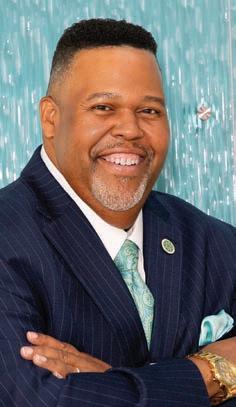
• Learn about local students from the Warrensville Heights and Cleveland Heights school districts who gained early exposure to college life through two summer college prep programs at the Eastern Campus.
• Meet faculty member Brian Johnson, Ph.D., an assistant professor of humanities who brings the material in his classes to life through classic texts and today’s urban legends.
• Read about Fairview Park police officer and Tri-C alumna Bethany Toth, who turned a passion for helping people into a career in law enforcement.
• Get to know Ann and Lou Frangos, who are longtime supporters of the College, with Ann serving on our Board of Trustees. The Pantry at our Westshore Campus was recently dedicated in their honor.
Thank you for picking up this copy of Tri-C Times. I hope you are as proud as I am that our College is changing lives, one at a time.
Sincerely,
Michael A. Baston, J.D., Ed.D. President, Cuyahoga Community College
Being a first-generation student is more than just a point of pride for families — it provides real career benefits for graduates and helps add momentum to our region’s economy.
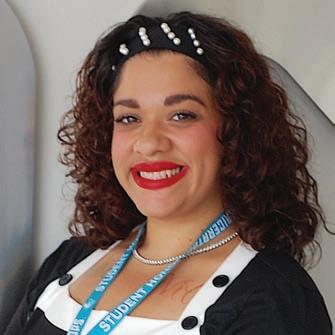
EDITOR
Jarrod Zickefoose
Erik Cassano
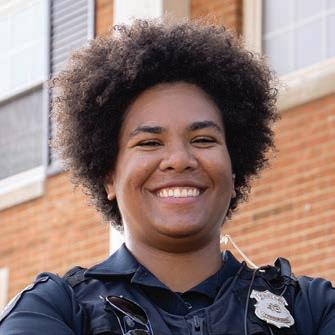
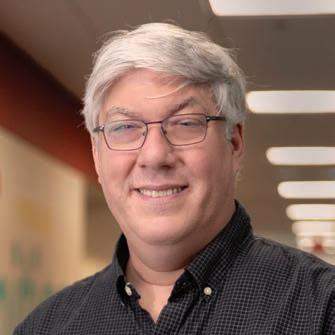
Anthony Moujaes
Jarrod Zickefoose ART
Debbie Benz PHOTOGRAPHERS
Victoria

Triceratops baseball head coach Kyle Stahlberg is taking his talents to Florida to join the coaching staff in the Miami Marlins minor league system. Stahlberg led the Triceratops on an epic 41-game win streak and to an Ohio Community College Athletic Conference (OCCAC) championship in his final season with the team.
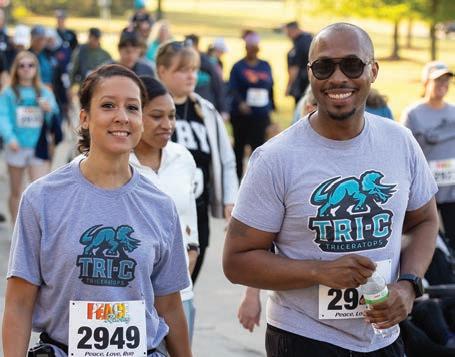
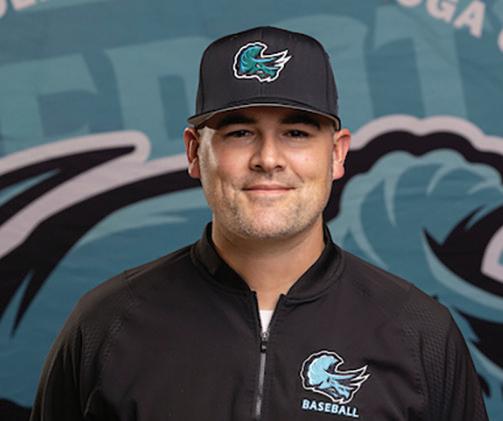
Tri-C’s 11th annual Autumn Blaze 5K was held on Sept. 13 at the College’s Western Campus in Parma. More than 180 people participated, and the event raised $5,000. Autumn Blaze is a 5K race with 5K and 1K walks. Funds raised go to the Greater Cleveland Food Bank, United Negro College Fund and United Way of Greater Cleveland.
Student enrollment at Tri-C remains on the rise, as Fall 2025 enrollment is 20,127, an increase of 894 students over Fall 2024. Growth is being driven by strong gains in College Credit Plus students (8.1% increase), new high school graduates (7.6% increase) and continuing students (1.8% increase), along with a notable 37% increase in Workforce Innovation enrollment.
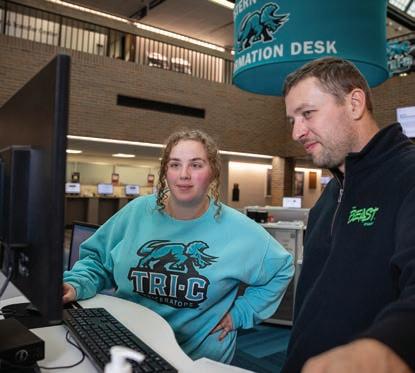






STORY BY Jarrod Zickefoose
College can make any person feel like a stranger in a strange land, but for first-generation students, that feeling can be amplified by orders of magnitude.
“My father is from Nicaragua, and he didn't finish high school because a war broke out in his country,” said Abigail Zuniga, a first-generation student at Cuyahoga Community College (Tri-C®). “My mother comes from a poor white family from West Virginia.
“When I first came to Tri-C, I didn’t know what I was doing. I saw a lot of other students there with their parents guiding them, and I was like, ‘Dang. My parents don’t know any of this stuff.’”
The role that college familiarity can play in a student’s academic life is subtle but powerful. When the parents have earned a degree, college is part of the background noise in the home. It creates a vernacular and a context that almost subconsciously allows a student to feel like they belong on campus when the time comes.
A first-generation student is one whose parents didn’t complete a degree. It’s hard to pin them down as a group, but they tend to come from lower-income families. In some cases, their communities may even ridicule college.
“There’s just one extra step that first-gen students have to take that maybe the others don’t,” Zuniga said. “It’s knowing the right questions to ask. It’s not a question of whether there are resources to help you. It’s a question of, ‘Do I know that there are resources?’ It’s scary because they’re realizing, ‘Here I am, taking this leap of faith that nobody I know has done.’”
These conditions are what administrators at Tri-C call barriers, and there is a team at the College that helps students overcome them.


“When I first came to Tri-C, I didn’t know what I was doing. I saw a lot of other students there with their parents guiding them, and I was like, ‘Dang. My parents don’t know any of this stuff.’”
— Abigail Zuniga
“The first thing I think about is support,” said Lana Benton, program manager for TRIO on the College’s Metropolitan Campus. “If you’re a student who’s not first-gen, you may have sat around the table and heard Mom or Dad talk about college and talk about their experience. You may have even visited a college campus. First-gen students — not at all. They haven’t sat around the table.”
TRIO is a federally funded program that helps lower-income students succeed in college. Benton said almost all of the 200 students she served on the Metro Campus were first-generation and added that funding for TRIO at Tri-C was stable.
Tri-C has TRIO Student Support Services offices at its Eastern, Metro and Western campuses. The TRIO Educational Opportunity Center is housed at the Jerry Sue Thornton Center. TRIO Educational Talent Search, Upward Bound, and Upward Bound Math and Science are housed at the Metro Campus.
Zuniga found her way to the TRIO program when an email from the College brought it to her attention. It provided the bridge that allowed her to cross confidently into college life. She learned the nuts and bolts of being a student at Tri-C, but, more importantly, she learned that she belonged.
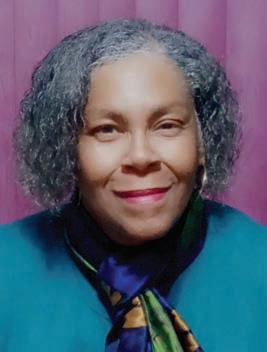

Benton said that even as TRIO introduces students to campus resources like financial aid and academic advising, one of its most important jobs is introducing first-gen students to other first-gen students. It not only shows them they are not alone but also gives them a sense of purpose. No one can understand and help a first-gen student like another first-gen student.
“I saw the difference that one small organization can make, and it’s become a goal of mine to make sure that everybody knows all the opportunities that they have,” Zuniga said.
Zuniga, a mother of six whose husband is a truck driver, is majoring in psychology and plans to eventually pursue a doctorate. She is the Student Government president at the Eastern Campus. Her goal is to create an organization that helps foster kids aging out of the system attain their bachelor’s degrees.
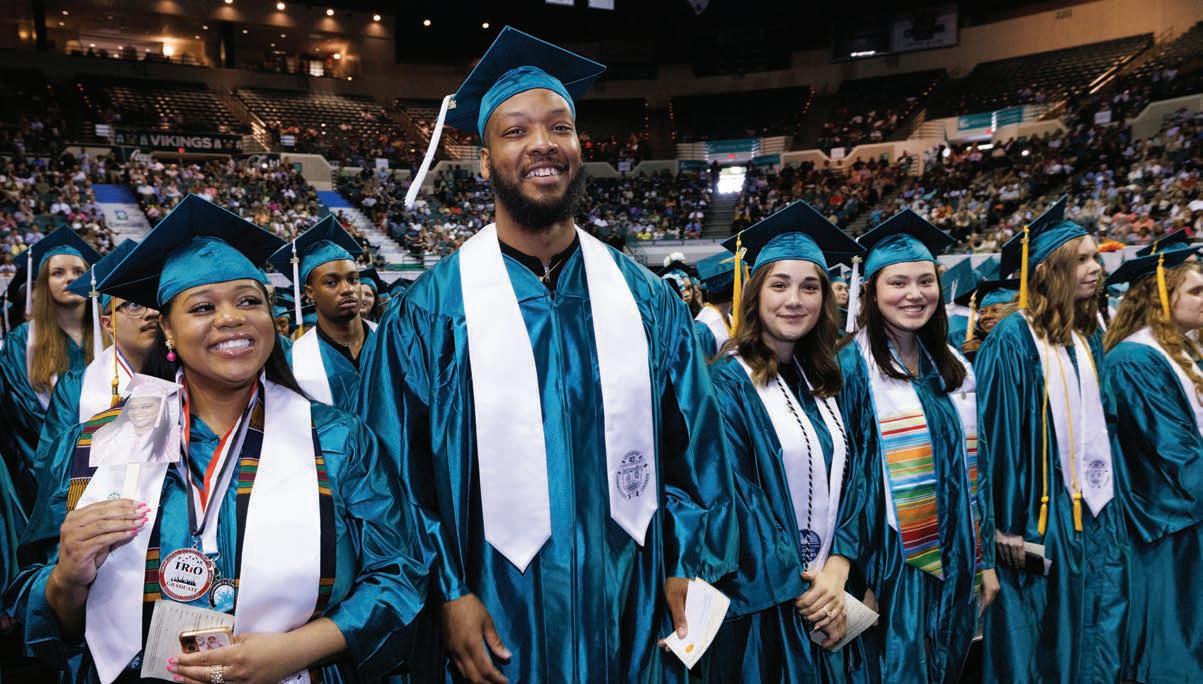
“The first thing I think about is support. If you’re a student who’s not first-gen, you may have sat around the table and heard Mom or Dad talk about college and talk about their experience. You may have even visited a college campus. Firstgen students — not at all. They haven’t sat around the table.”
— Lana Benton
Statewide, 37% of college populations are first-generation students. That number is higher in Northeast Ohio due to many factors: more people going directly into the workforce, lower rates of degree attainment, NEO’s industrial heritage and a large immigrant population.
At Tri-C, 56% of enrolled students are first-generation, a figure that has remained consistent over the years, fluctuating between 56% and 58%.
Recognizing this, in 2018, Tri-C zeroed in on the success of first-generation students. Support responsibilities were extended from TRIO to the College as a whole, with TRIO maintaining a lead role.
A new slogan began appearing on T-shirts and banners around the College. It read, “It Takes Courage To Be the First.”
“How do we help these students deal with imposter syndrome, build the resilience and the grit to persist, learn how to navigate the community or the College system, build agency and advocacy for themselves and for others, but really still feel like they belong here?” Angela Johnson, Ed.D., vice president of enrollment management, said. “We want to help them build that sense of belonging and mattering — not just at Tri-C but as college scholars.”
The College created the First Scholars Institute, developed to build community and a sense of belonging for first-gen students. It offers ongoing programming, like the First Scholars Symposium and themed events on, for example, financial planning. In addition, it teaches faculty and staff how to support first-generation students and sets measurable goals to increase first-generation student success.
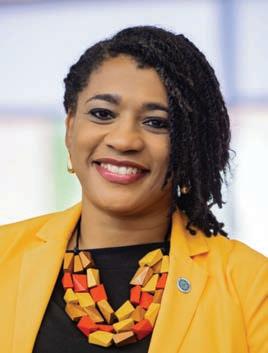

Tri-C also introduced First Scholar Advocates — staff and faculty committed to ensuring the success and empowerment of first-gen students by providing support through social, emotional, academic and financial resources.
“There were a lot of scary things as a first-generation student, and that’s what made it hard — not having the confidence in me to do this. But when I got here, I became a light,” Zuniga said. “I just blossomed beautifully here, and I love it.”
These Collegewide initiatives work in concert with TRIO to create a powerful advocacy system for first-gen students that helps them acclimate to college and, ultimately, persist and earn their degrees or certificates. FirstGen Forward, a national advocacy organization, advanced the College to the highest phase of the First Scholars Network of Institutions. Tri-C is one of only 18 higher education institutions selected for the newest class of FirstGen Forward Network Champions.
Johnson said that Tri-C’s philosophical goal was to reduce the number of first-gen students to nearly zero in the future by making sure as many current first-gen students as possible earn a degree or certificate now.
“It’s imperative for us to reduce that number in our region,” Johnson said.
That imperative is being realized one household at a time.
“If my kids see me doing my homework and me going places, my kids are going to go places,” Zuniga said. “My kids are going to get good grades. If I’m studying and doing schoolwork, they’re studying and doing schoolwork.”
STARTING AT TRI-C IS A SMART PLAY FOR COLLEGE
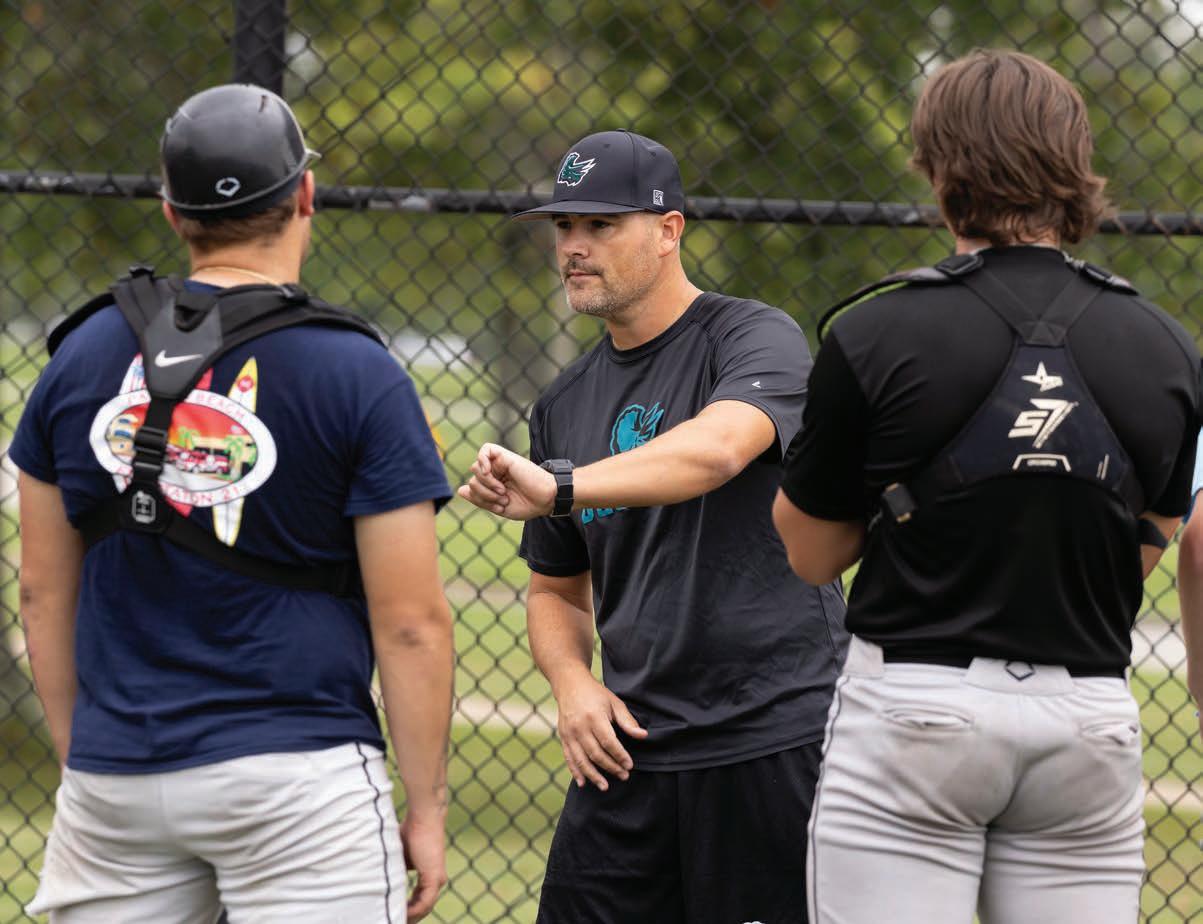

For high school athletes, the best path to a National Collegiate Athletic Association (NCAA) school may now run through a junior college.
Increasingly, four-year colleges are scouting two-year schools for recruits because the athletes are acclimated to the academic rigors of college, have logged collegiate-level field time, and have learned to balance classes, training and travel.
Junior college — or JUCO — athletes are often better prepared for the academic and athletic demands of an NCAA school and, as such, are highly desirable to four-year recruiters. JUCO programs also produce student-athletes better positioned to score scholarships at four-year schools.
It’s a win-win for both JUCOs like Cuyahoga Community College (Tri-C®) and NCAA schools.
“It’s a very, very good space for us to be in,” Anthony Franklin, executive director of Athletics, Wellness and Recreation at Tri-C, said. “At the highest level, the four-year schools are not about development anymore. The development is at the JUCO level.”

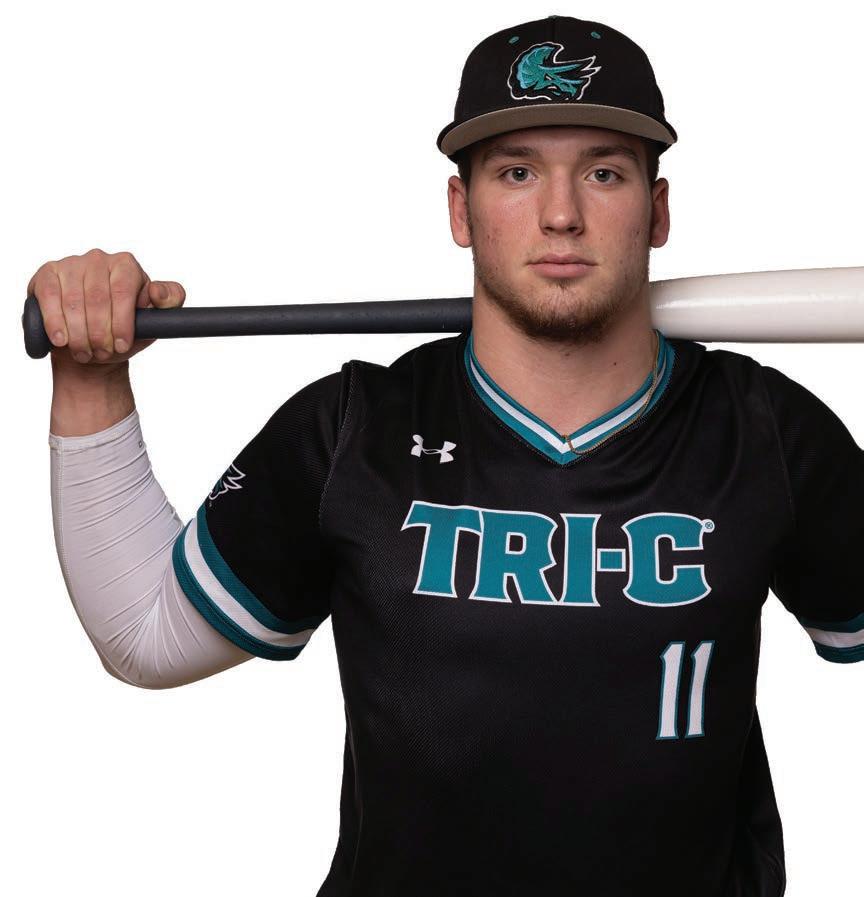

The trend in JUCO recruitment started after Covid, when eligibility waivers opened the pool of two-year college athletes to NCAA schools. These athletes already had a couple of years of college-level experience and, critically, were now eligible to play at a four-year school.
Though it faces legal challenges, the eligibility transfer rule remains intact.
JUCOs themselves had been waiting for this moment.
The yearslong burnishing of their academic and athletic reputations had resulted in a visible glow that four-year schools couldn’t ignore.
“JUCOs used to have a stigma that the athletes didn’t have the academic chops,” Franklin said. “That covered the JUCO landscape for half a century.”
It’s a different story today.
“In the last five or 10 years, the credibility of junior colleges has increased dramatically,” said Kyle Stahlberg, who led the Triceratops baseball team to an Ohio Community College Athletic Conference (OCCAC) championship last spring with a 44-8 record that included an epic 41-game win streak.
“For places like Tri-C, the academics are very, very good. The support is very, very good. The facilities are amazing, and the baseball program now has a good track record for proving that it’s a great place to develop. It’s a viable academic and athletic option.”
According to the website Keep Playing Baseball, 80 JUCOs had 20 or more alumni playing on four-year college baseball teams in 2017. By 2023, that number had jumped to 207 two-year schools.
“JUCOs used to have a stigma that the athletes didn’t have the academic chops. That covered the JUCO landscape for half a century.”
— Anthony Franklin
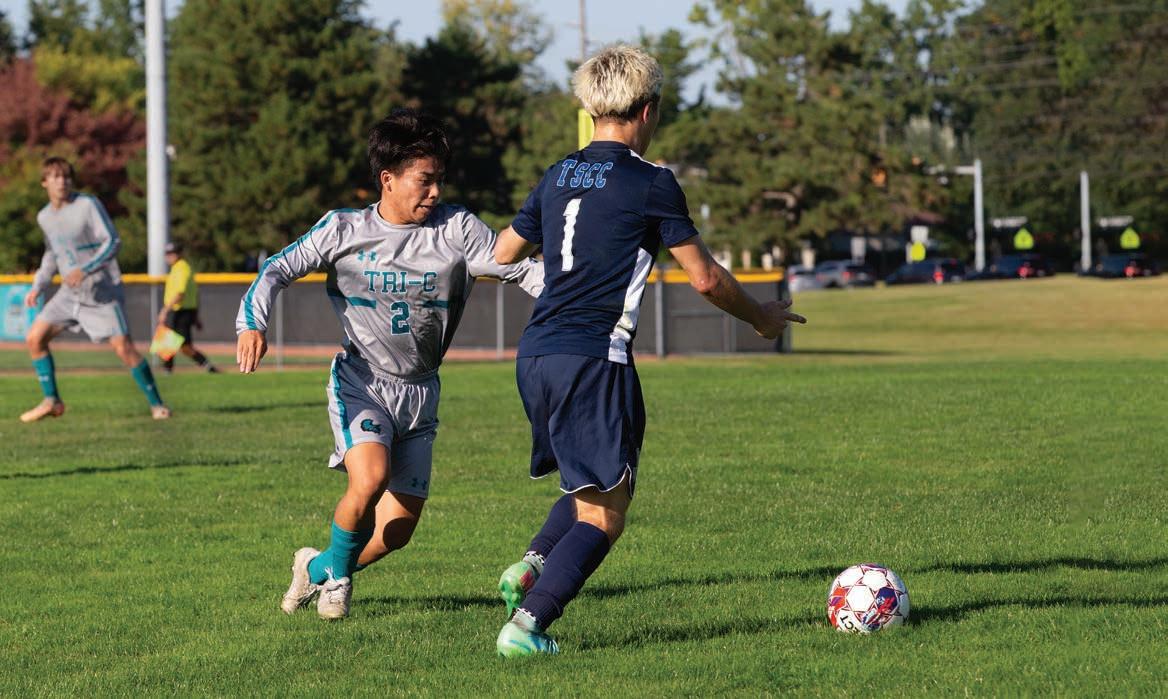
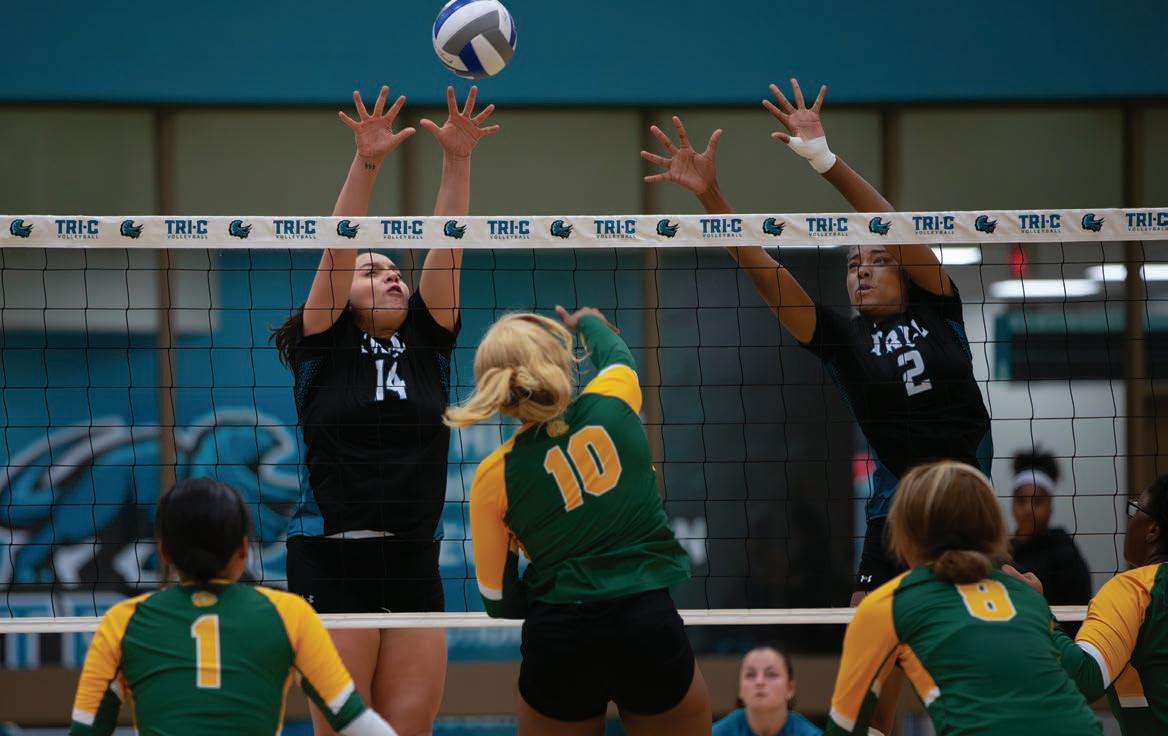
Stahlberg took over as head coach of the Triceratops baseball team in 2022, following three dormant seasons due to Covid. He won the OCCAC’s Coach of the Year award twice and recently took a position with the Miami Marlins organization to coach in their minor league system.
During his time leading the Tri-C program, 19 baseball players have transferred to DI, DII, DIII or NAIA schools.
“At Tri-C, what we’re trying to do is identify the athletes who are hungry for it, the ones who want it real bad, and they’re just not quite there yet,” Stahlberg said.
During the 2024-2025 academic year, NCAA roster limits for DI baseball teams shrunk from 40 to 34 — so while the effect is still playing out, the few spots that might have been available to develop players aren’t there anymore.
“The number one thing is development, so we make sure we are giving them the structure, support and opportunity to develop as much as they possibly can, and that makes them an attractive option for a Division I or Division II program,” Stahlberg said.
“Development takes several forms. Yes, you’re here to participate on the baseball team, but No. 1, you’re here to get a degree, so we want to make sure that they have the environment, structure and support to excel in the classroom.”
JUCOs save NCAA DI, DII, and DIII schools time and money on recruiting, fill roster gaps and introduce developed players who can make an immediate impact.
In 2024, Triceratops outfielder Kyle Koehler was an NJCAA Division II First Team All-American. He transferred from Tri-C to Florida International University, an NCAA DI school. In his first season there, he played nine games, starting in two. Tri-C’s basketball program has also sent players directly to DI schools.
However, for some players, the goal is not necessarily DI competition. It’s using their athletic prowess to pay for college.
“At Tri-C, what we’re trying to do is identify the athletes who are hungry for it, the ones who want it real bad, and they’re just not quite there yet.”
— Kyle Stahlberg


Softball player Tia Rizzo attended DII Notre Dame College of Ohio on an athletic scholarship after competing and studying at Tri-C from 2017-2019. She earned her associate degree from Tri-C and, in 2022, her bachelor’s in psychology at Notre Dame.
“I was really happy I went to Tri-C first,” Rizzo said. “It got me used to college and college sports, and I saved so much money. If I went to a four-year off the bat, I probably would be in debt, but I have no debt.”
She started her college journey at Tri-C with an athletic scholarship and said her time at the College was instrumental in earning her scholarship to Notre Dame. She doubted she would have received any scholarship money had she gone right to a four-year from high school.
Rizzo, who graduated from Oak Hills High School in Cincinnati, added that attending Tri-C allowed her to explore different fields of study without feeling like dollar bills were flying out the window.
“I got my four-year degree, and I probably paid less than half of what most people do who go to a four-year school right from high school,” she said.
And it’s not as if she sacrificed anything on the softball diamond.
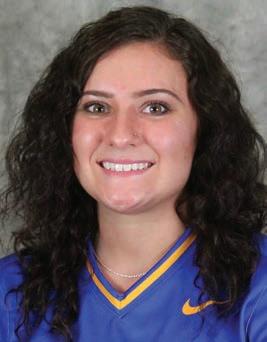
“Tri-C has a very good softball program, and my experience playing there was very similar to my experience at Notre Dame. We played some tough competition at Tri-C. We went to the national tournament. We were playing girls who probably went DI. There are great athletes who play at the JUCO level.”
Tri-C’s position as a leading two-year institution means it gets a lot of looks from NCAA recruiters, and because of that, the College can draw high school athletes like Rizzo from farther afield than Northeast Ohio.
“I was really happy I went to Tri-C first. It got me used to college and college sports, and I saved so much money. If I went to a four-year off the bat, I probably would be in debt, but I have no debt.”
— Tia Rizzo
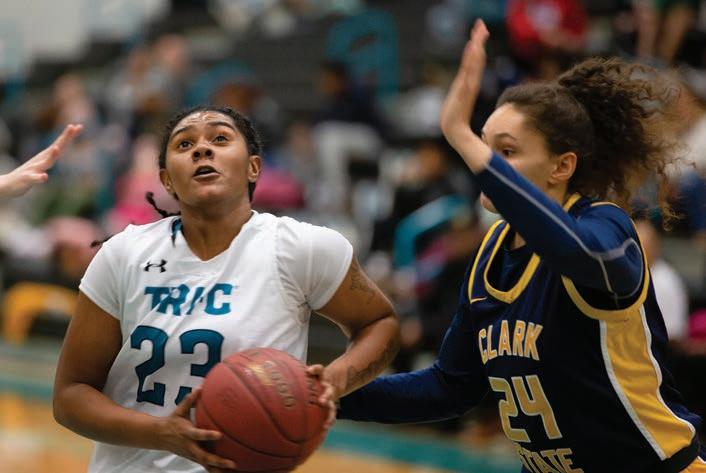
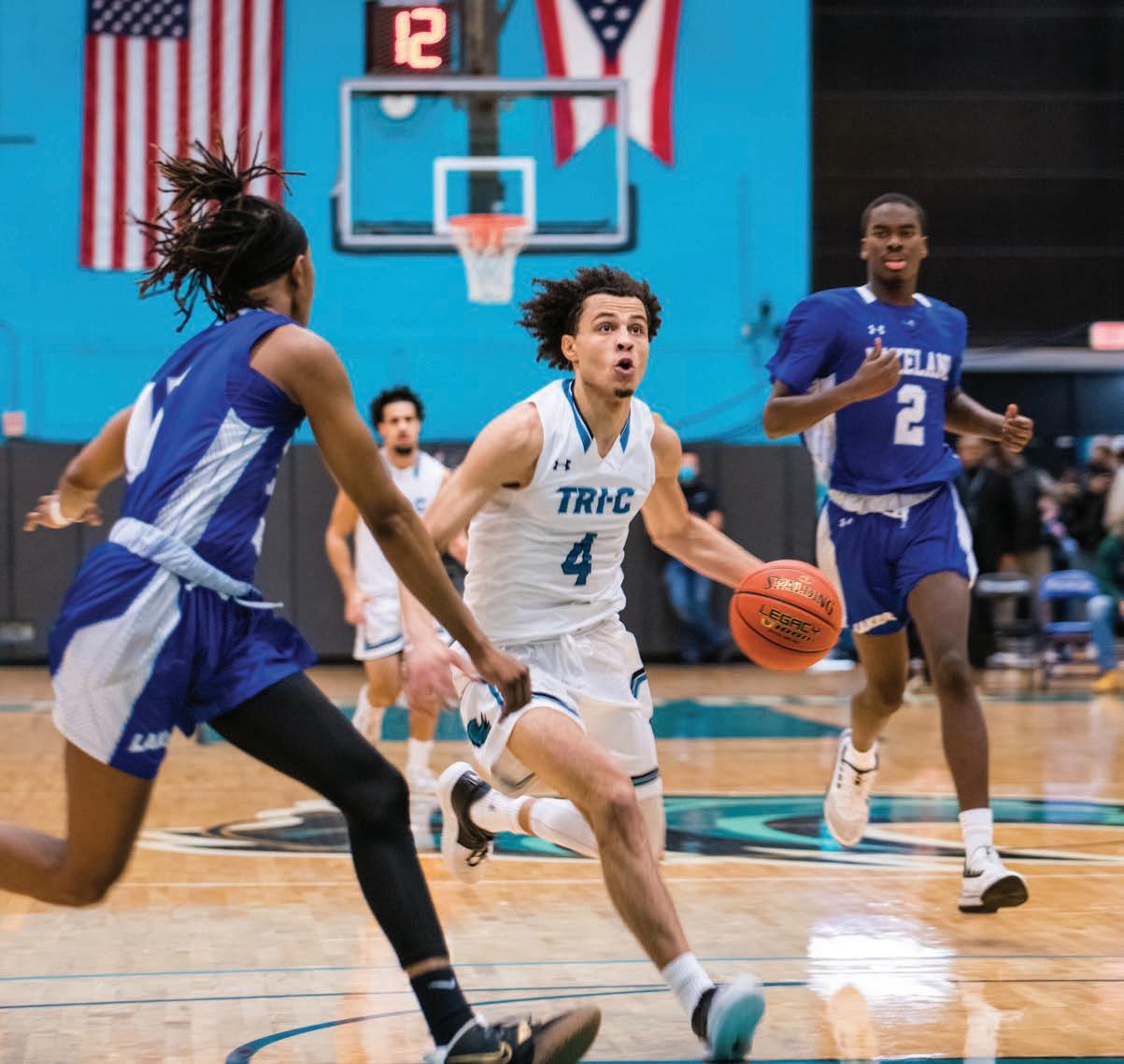
“The yellow brick road now runs through Tri-C.”
— Anthony Franklin
For most high school athletes, developing at Tri-C is a sensible way to increase their chances of competitive success on the field and in the classroom at an NCAA school.
Franklin said, “The yellow brick road now runs through Tri-C.”

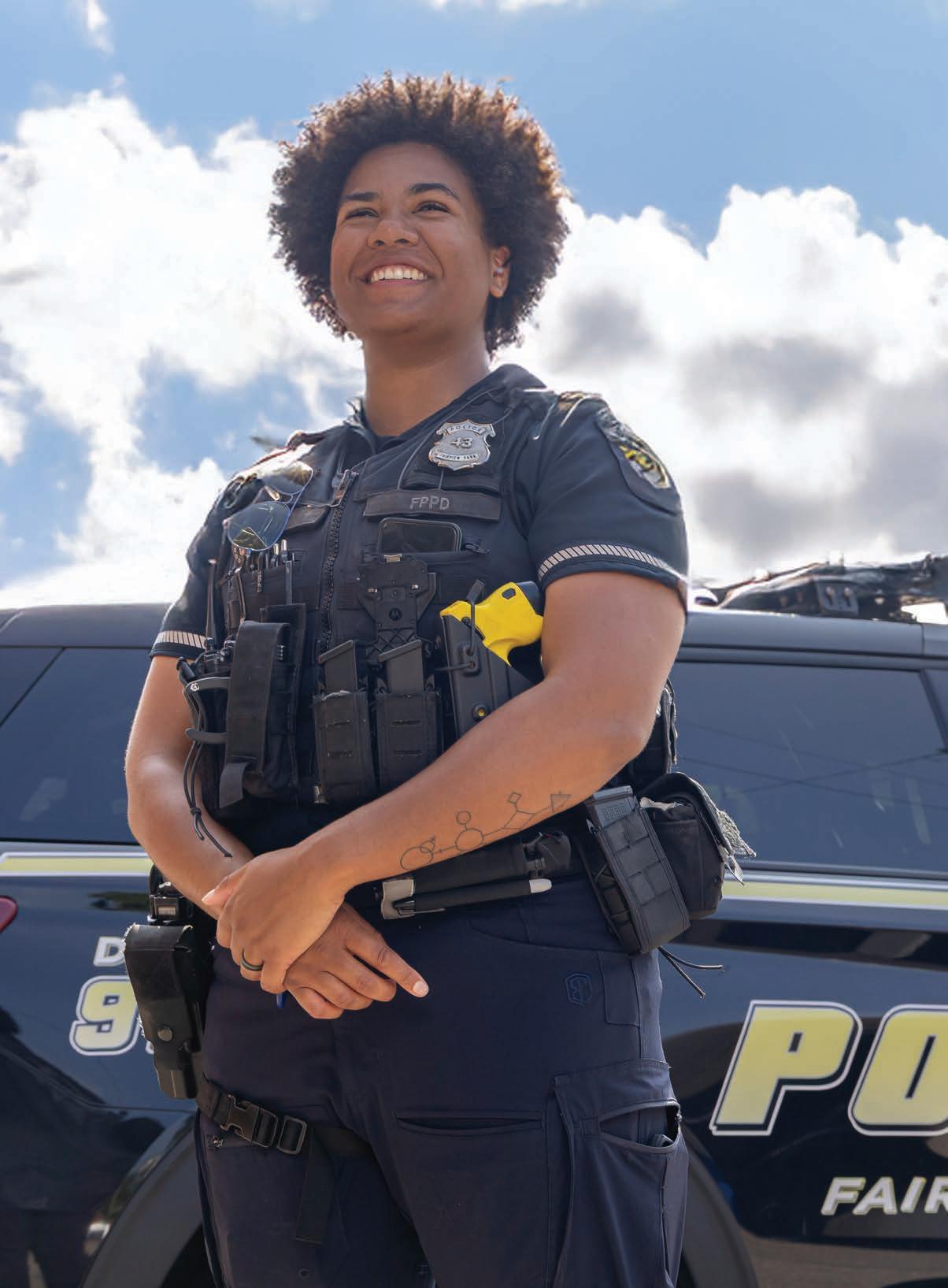
There’s a reason why it’s long been said that police work is a calling. As a law enforcement officer, you are often on-scene with people who are experiencing their worst days.
They might be victims of burglary, domestic abuse, traffic accidents or a host of other crimes or incidents. Or they might be suspects in a crime, dealing with drug addiction, mental illness or other life conditions that have brought them to a desperate place.
It’s physically and emotionally challenging work, but where others might see barriers, Bethany Toth sees opportunities to help people.
Toth graduated from Cuyahoga Community College (Tri-C®) with an Associate of Applied Science in Criminal Justice in 2018 and graduated from Tri-C’s Basic Police Academy in 2022. For the past three years, she has worked as a patrol officer in Fairview Park.
“I know people often aren’t happy to see the police because if we’re there, it means something has gone wrong,” she said. “But we also have the opportunity to improve the situation, and sometimes that’s just by talking and listening.”
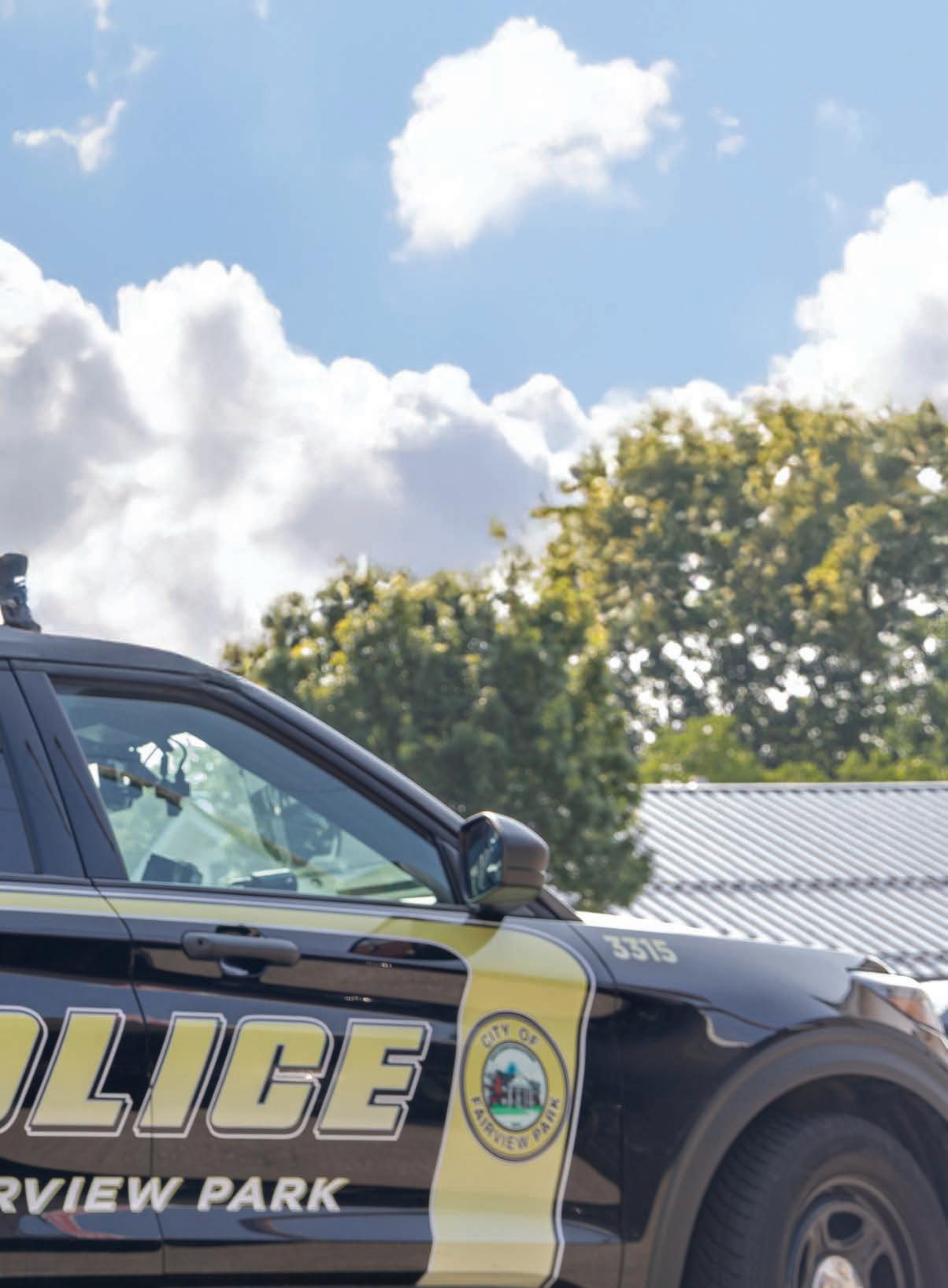
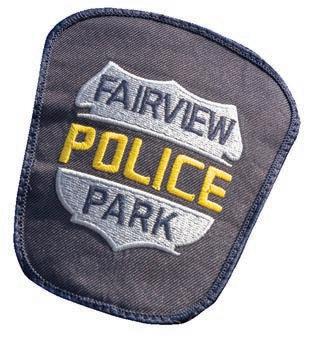
“I know people often aren’t happy to see the police because if we’re there, it means something has gone wrong. But we also have the opportunity to improve the situation, and sometimes that’s just by talking and listening.”
— Bethany Toth
In addition to her standard patrol duties, Toth is a trained negotiator and a member of the Westshore Enforcement Bureau (WEB) negotiating team. Most people might associate police negotiators with tense, high-drama situations like a barricaded suspect. While Toth could be called upon in that kind of situation, she finds many other uses for her negotiating skills in her daily work.
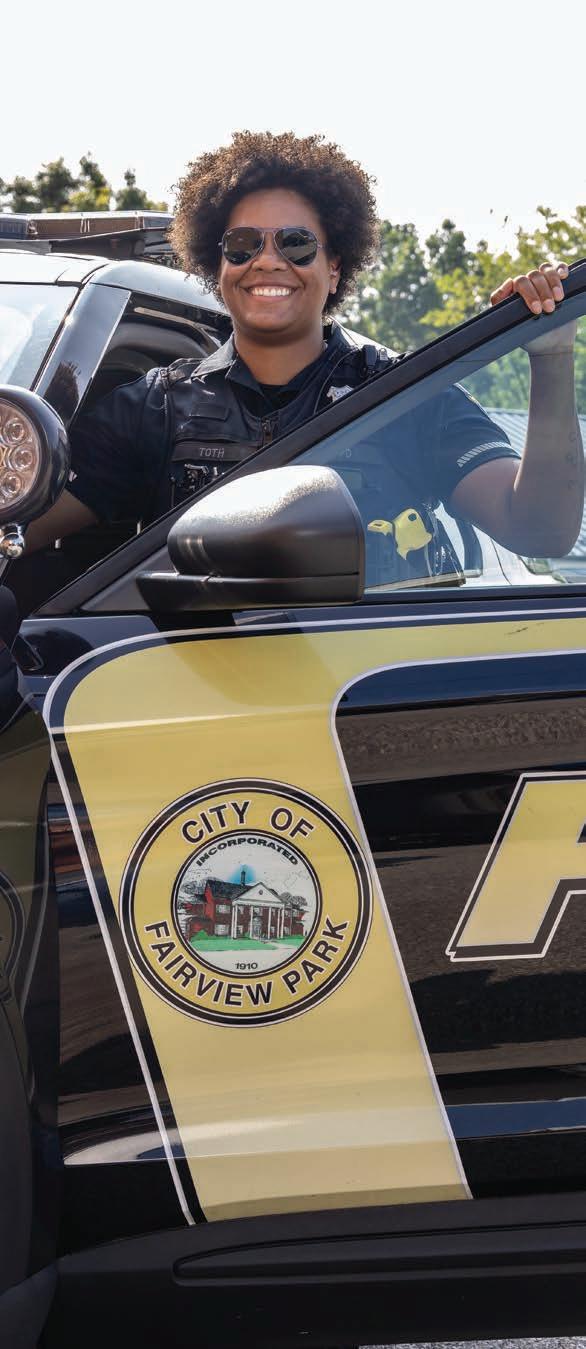
“Police work often isn’t like what you see in the movies and TV with some massive standoff,” she said. “In many cases, you can use negotiating skills to just have a oneon-one conversation and de-escalate a situation. Some people are in a really difficult place in life, and they just need to vent. Sometimes you can calm a person down just by letting them know that you’re listening and want to help them.”
Toth has always been interested in a career that helps people, but her passion for police work took root during her time at Tri-C.
Toth, 27, graduated from Lakewood High School and considered a variety of career options before choosing criminal justice.
“When I was a kid, I wanted to be a spy like on TV shows, but as I got more serious, I started looking at a lot of options — journalist, interior designer, fashion designer, lawyer, therapist,” she said. “But as I thought more about it, I knew I wanted a job where I could help people in the moment and where I didn’t have to sit at a desk all day. That’s when I started to really think about criminal justice and police work.”
Toth chose Tri-C because it was affordable and had many different course options.
“I didn’t want my parents to have to pay for my college,” she said. “I was working while going to college, so Tri-C was able to fit my budget and my schedule.”
After graduating with her associate degree, Toth continued her education through a remote learning program at Tiffin University, where she earned a bachelor’s degree in criminal justice. By the time she graduated from Tiffin, she was old enough to apply to police academies.
“In most places, you have to be 21 to enter a police academy,” she said. “I looked around at different academies, but this was right around the time of Covid, and a lot of them were shutting down. That’s when I turned back to Tri-C, which still had its academy open.”
“Even after you’ve been through the academy, you’re always training. You always have to do additional training to add skills and keep your certifications up to date. You try to add specializations, if possible, which is why I became a negotiator."
— Bethany Toth
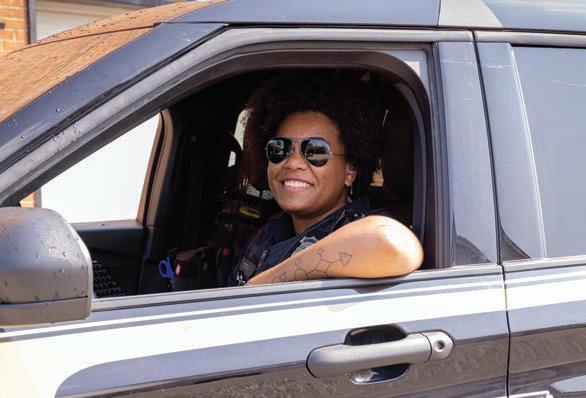
At the Tri-C police academy — as with her time as an undergraduate student at the College — she benefited from the support of instructors with real-world experience.
“The instructors at Tri-C have a tremendous knowledge base,” Toth said. “All of the instructors in the police academy or criminal justice classes were either active or retired police. They had a lot of real-life experiences and stories to share, and they always made sure we had a thorough understanding of the material.”
And it wasn’t just the instructors — Toth’s classmates also supported each other in reaching their goals.
“It was a very motivating environment because everyone was there to move their life forward,” she said. “Everyone wanted to earn a degree, get a job and move up in life. We were all very goal-oriented and focused, and that’s the type of learning environment I wanted.”
Tri-C also helped reinforce a love of continuing education for Toth — which is important in a constantly changing field like policing, where laws and regulations are continually being reviewed and revised.
“Even after you’ve been through the academy, you’re always training,” she said. “You always have to do additional training to add skills and keep your certifications up to date. You try to add specializations, if possible, which is why I became a negotiator.
“I always like to seek out new ways to add to my skill set and make me a better officer. You always want to see the cases you work on resolved in the most positive way, for the sake of justice and to help the victims of crime heal.”
Policing is challenging work, but it can be rewarding work if you have a passion for serving others. Toth is grateful that she had the chance to lay the foundation for her career at Tri-C.
“I received a great all-around education at Tri-C,” Toth said. “They have great instructors, and the whole College is very supportive in helping you reach your goals. Many of the things I learned there are things I still use today. Going there has helped make me a better law enforcement officer, a better police negotiator and a better member of the community I serve.”
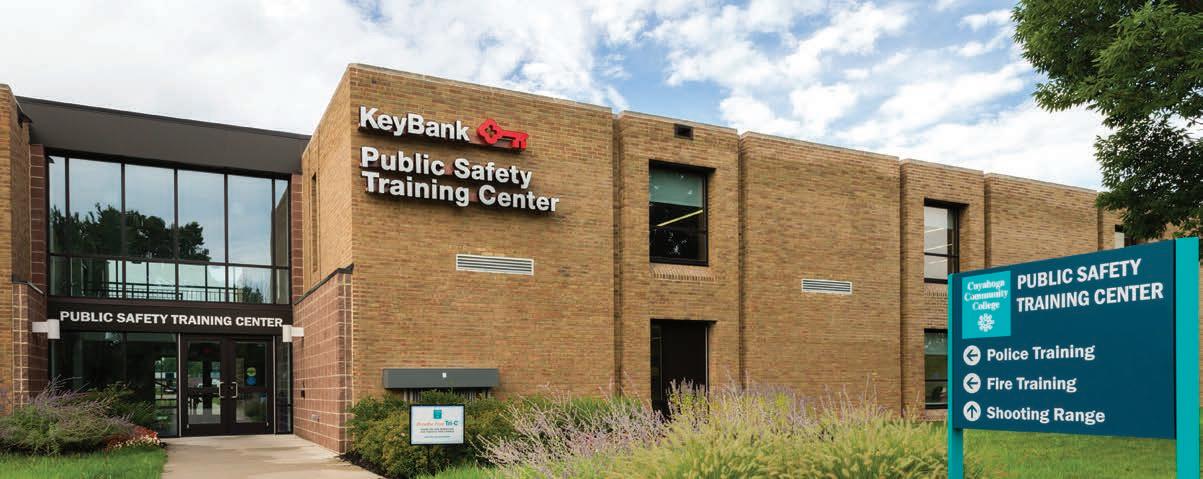

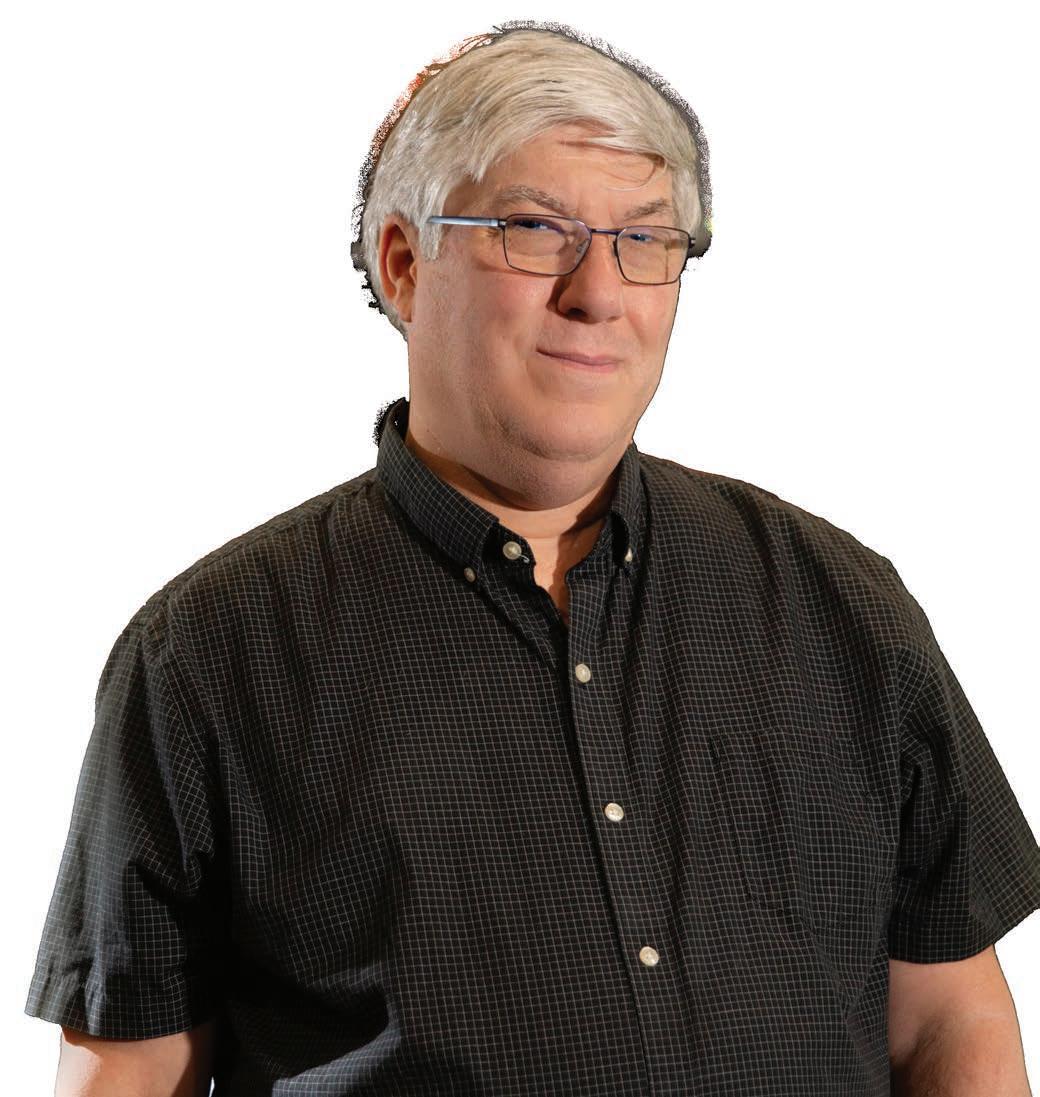
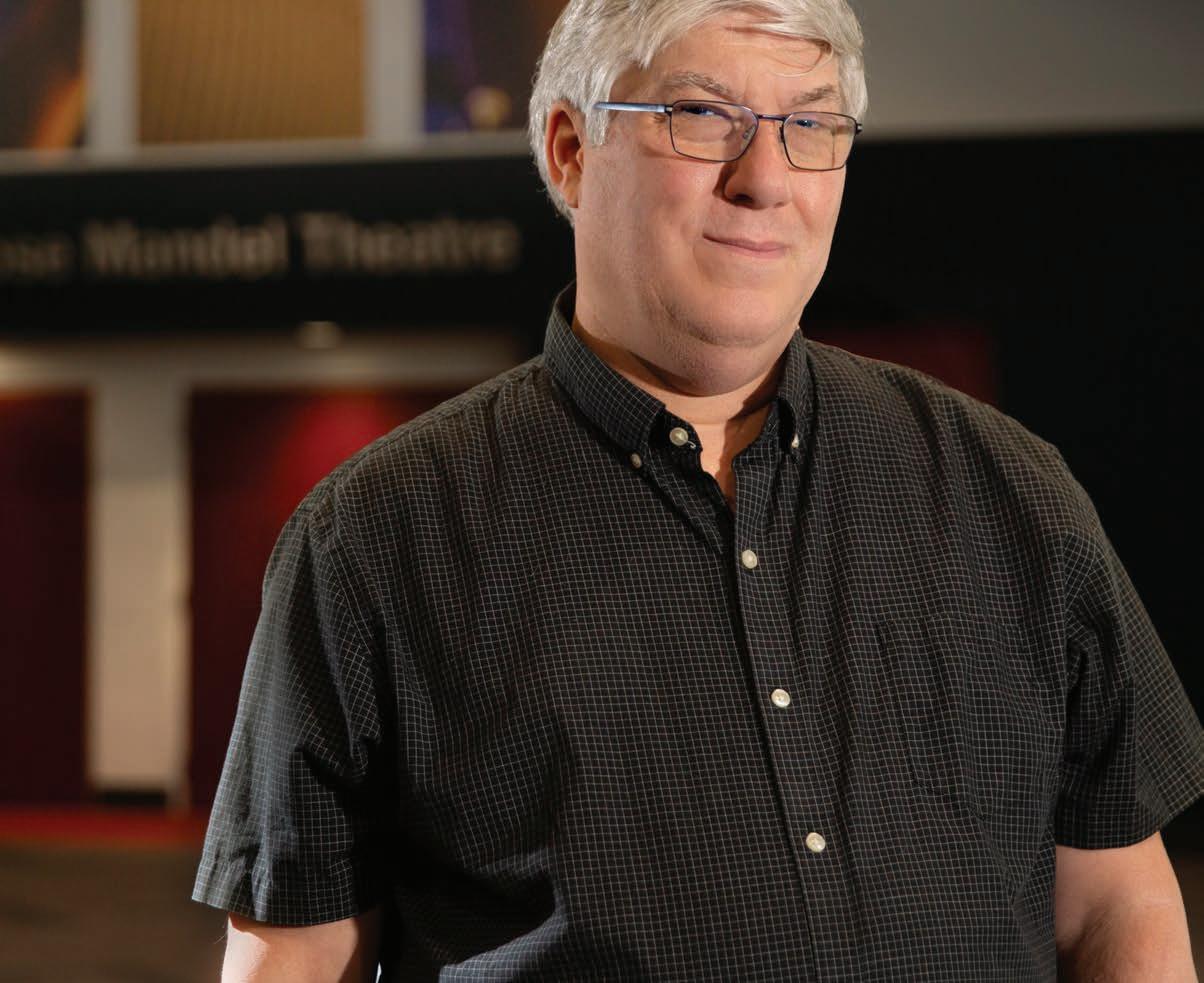
Most students walk into a humanities class expecting antiquated names and dates. They don’t expect to discuss haunted Pokémon levels or cursed eBay listings.
As an assistant professor of humanities at Cuyahoga Community College (Tri-C®), Brian Johnson, Ph.D., enjoys bringing the material in his classes to life by showing its relevance today.
In his Culture and Belief course, for example, he ties classic texts and ideas to contemporary culture — think Dante meets Creepypasta, and The Oresteia meets online horror myths, such as Slender Man.
“Today’s ghost stories are yesterday’s epic poems,” Johnson said. “The medium changes, but the questions don’t. What is evil? What is justice? What do we believe — and why?”
In all of his courses — ranging from introductory humanities to deep dives into justice, belief systems and art — classical texts are treated as mirrors, reflecting the values and anxieties of every age.
“I want students to look at a work of art or literature and not feel like they need to read a plaque in a museum to understand it,” he said. “They should feel like it belongs to them.”
A native of northern California, Johnson earned his bachelor’s and master’s degrees in English in 2000 and 2003, respectively. But when he decided to pursue his Ph.D., he took a piece of academic advice he’d received to heart.
“I was told, ‘If you’re going to get your Ph.D., you shouldn’t stay where you are because then it just lets everybody know that you won’t move,’” he said.
He ultimately landed at the University of Massachusetts Amherst. Recently married, he and his wife drove 2,000 miles to a state that “felt like another country” and began a nearly decade-long stretch on the East Coast.
He received his Ph.D. in 2010 and landed a full-time visiting professor position at the now-closed Marlboro College in Vermont — a tiny liberal arts school tucked away on an old apple farm.
“Today’s ghost stories are yesterday’s epic poems. The medium changes, but the questions don’t. What is evil? What is justice? What do we believe — and why?”
— Brian Johnson
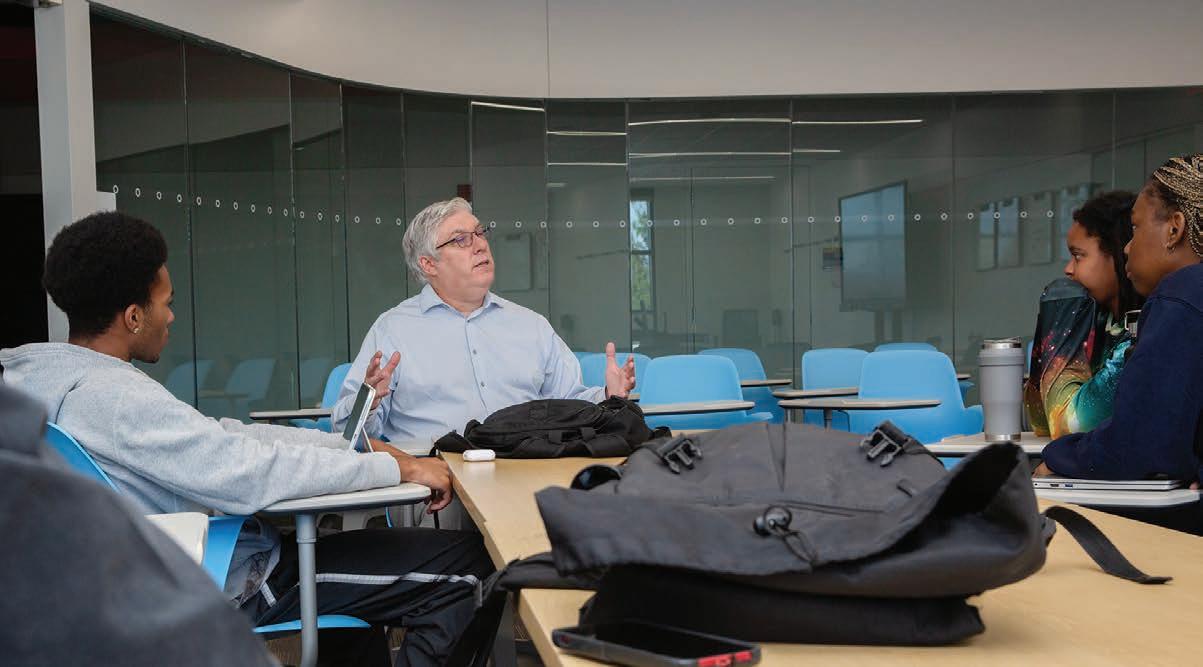
After spending a year at Marlboro, Johnson and his family found their way to Ohio when he received a teaching opportunity at Case Western Reserve University through the Seminar Approach to General Education and Scholarship (SAGES) program. When the three-year contract at CWRU ended, he decided to make Beachwood his family’s permanent home, especially since he had two kids in the local school system.
He worked at Cleveland State University for about two years before learning about an opening at Tri-C’s newly formed Jack, Joseph and Morton Mandel Humanities Center on the Eastern Campus.
Johnson was hired as the College’s first official humanities professor. He’s become a cornerstone of the Mandel Scholars Academy, teaching and designing courses for the humanities.
“I was just kind of hired to figure out how Mandel’s curricula would work and to be the present and quasipermanent feature for the students’ experience of Mandel,” Johnson said.
He also enjoys working with students in an advisory capacity and helping them move on to four-year institutions. He has collaborated with CSU’s Jack, Joseph and Morton Mandel Honors College, CWRU’s Cleveland Humanities Collaborative and other universities.
“I’ve got a lot of success stories,” he said. “I've sent students on to tons of schools, and I love that.”
In addition, he has enjoyed taking second-year Mandel students on study trips, from Alabama to Italy and Japan.
“It’s been really successful,” Johnson said. “I’m hoping it carries forward. It’s a great thing for the students.”
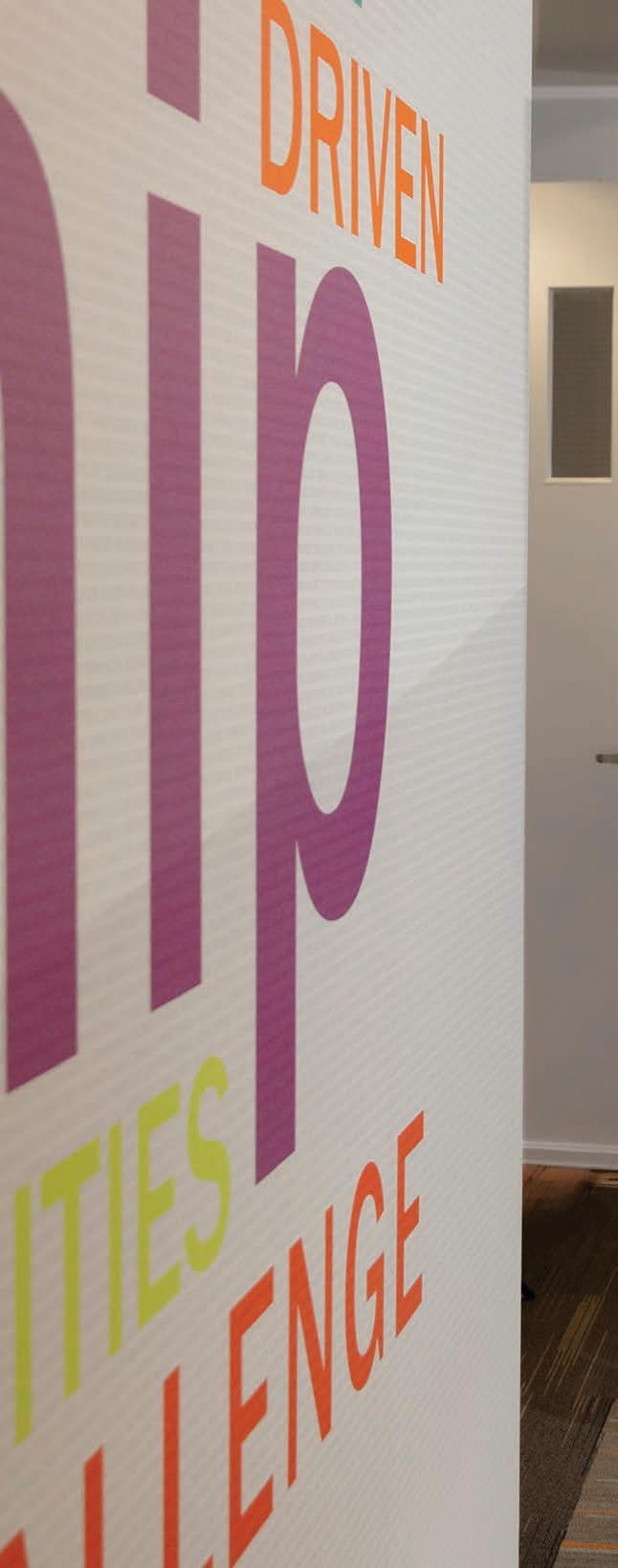
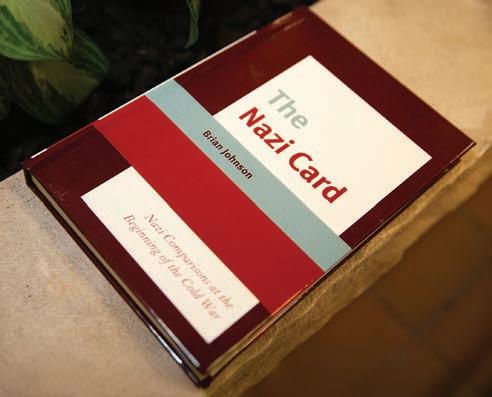
Johnson has two books to his name published by Lexington Press: he served as an editor on The Function of Evil Across Disciplinary Contexts and wrote The Nazi Card: Nazi Comparisons at the Beginning of the Cold War
As a fan of postmodern literature, he has long been fascinated by works steeped in moral ambiguity by authors such as Thomas Pynchon, Kurt Vonnegut and Joseph Heller. In these works, he noted a common theme: Nazis.
From Raiders of the Lost Ark to Star Wars, Johnson notes that Nazi imagery and tropes pervade American pop culture, showing how they’ve become a cultural shorthand for evil. In his books, Johnson examines how these references function in literature, film and political speech and what happens when the definition of “Nazi” shifts over time.
Johnson is quick to note that he doesn’t teach about Nazis extensively in his humanities courses.
“It’s not my students’ job to become experts in that,” he said. “It’s mine. I want to teach them how to think critically — not just what I know.”
Whether he’s leading a classroom discussion or building a new curriculum, his ultimate goal is to meet students where they are and treat their insights as valuable — helping them develop a deeper understanding of themselves and the world.
“The humanities let us explore those strange nooks and crannies of human experience,” Johnson said. “And that’s where the learning really happens.”
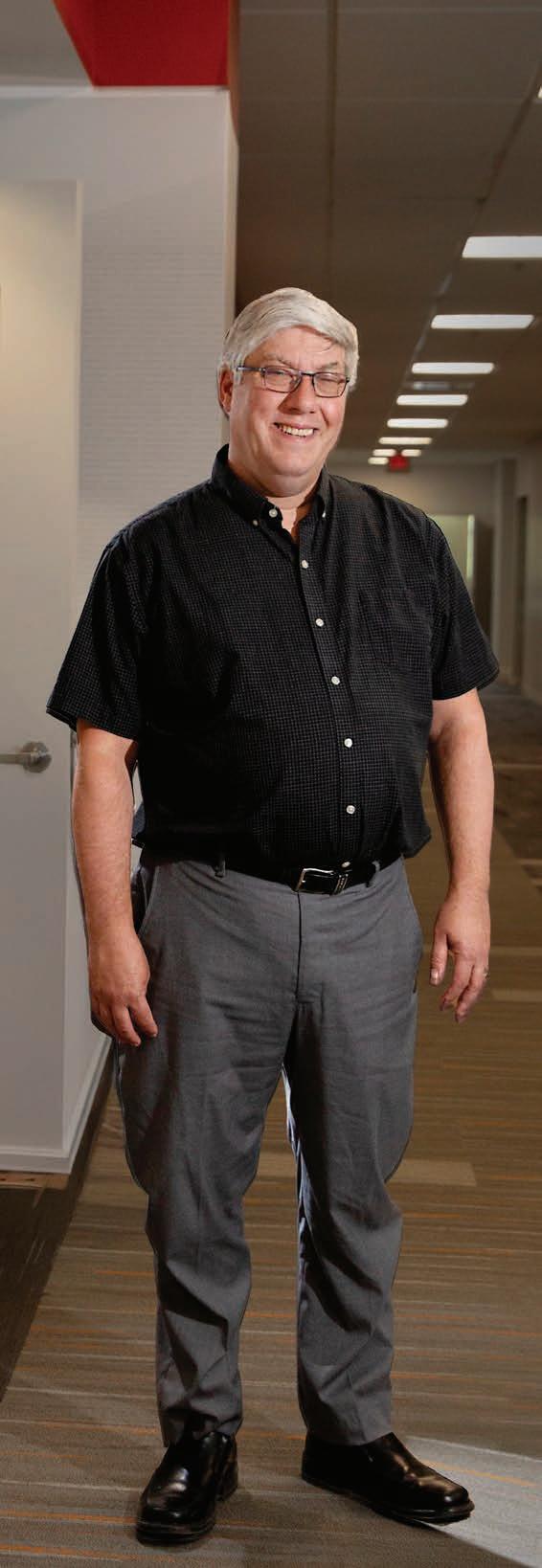
“The humanities let us explore those strange nooks and crannies of human experience. And that’s where the learning really happens.”
— Brian Johnson
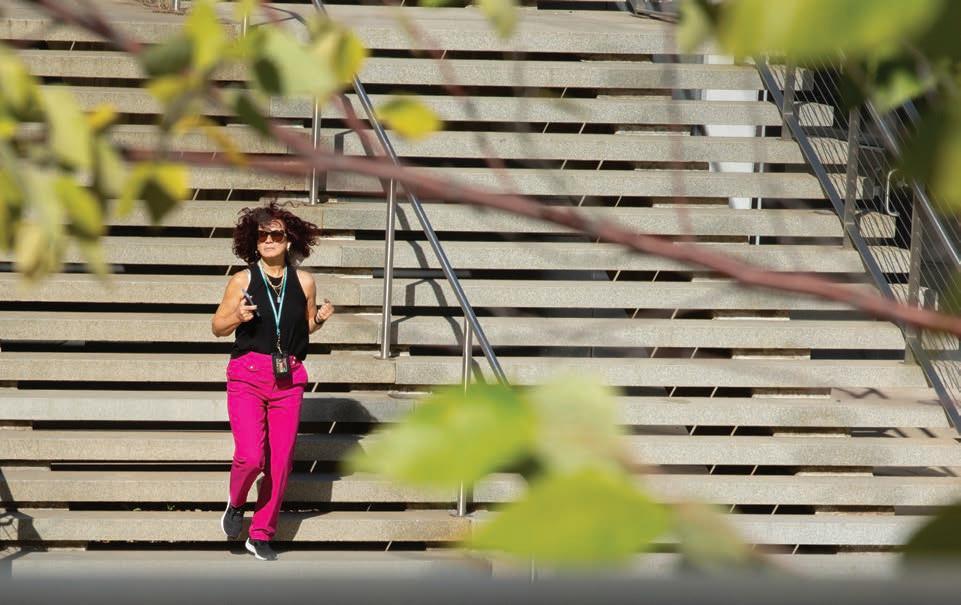
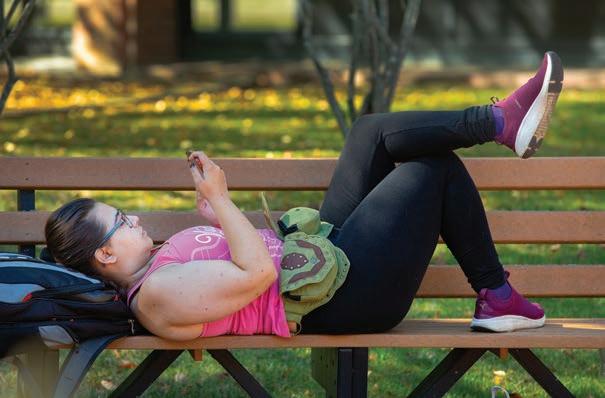

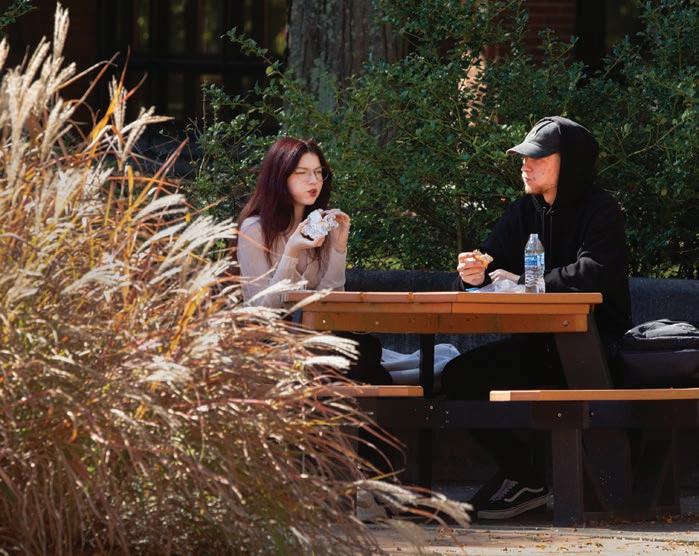
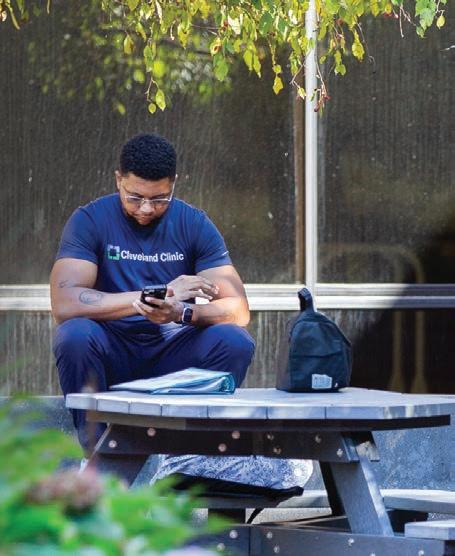

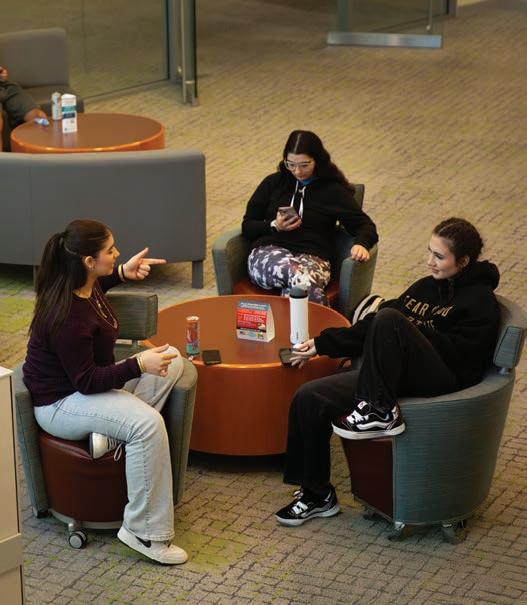

At Tri-C Times, we use a lot of words to tell you what life is like for students at the College, but sometimes a picture can do the job, and fall has that college-life vibe like no other season. So, here are some recent scenes from around the campuses.
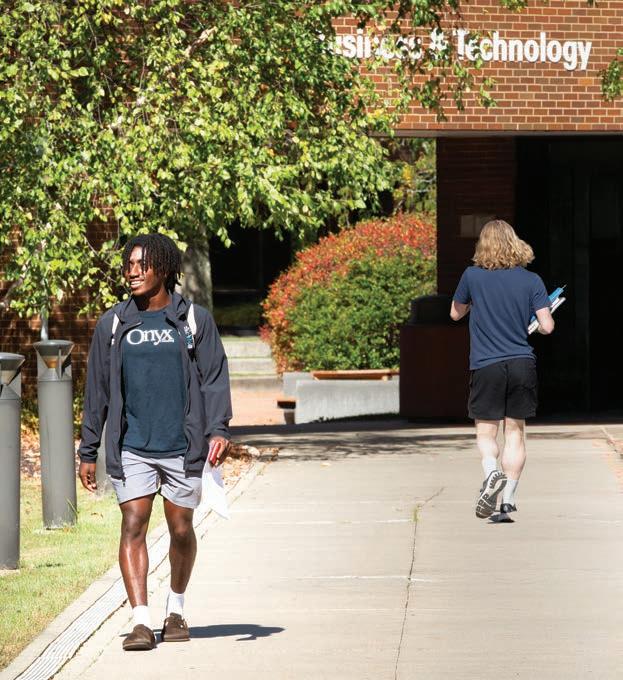
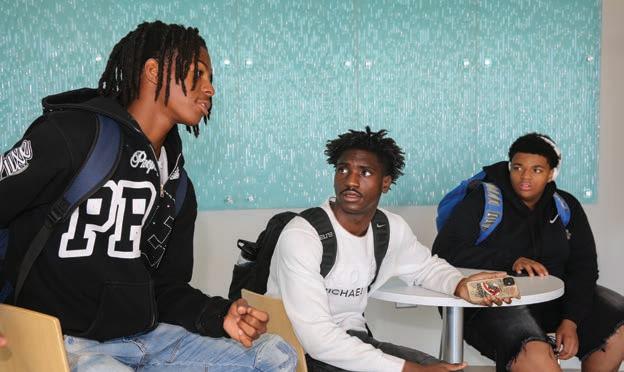
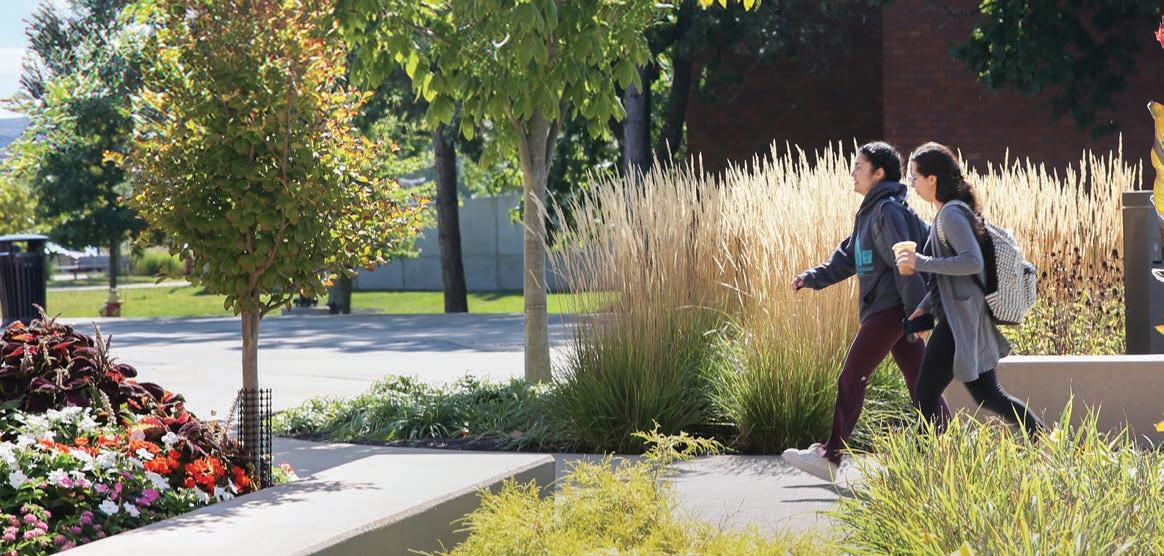
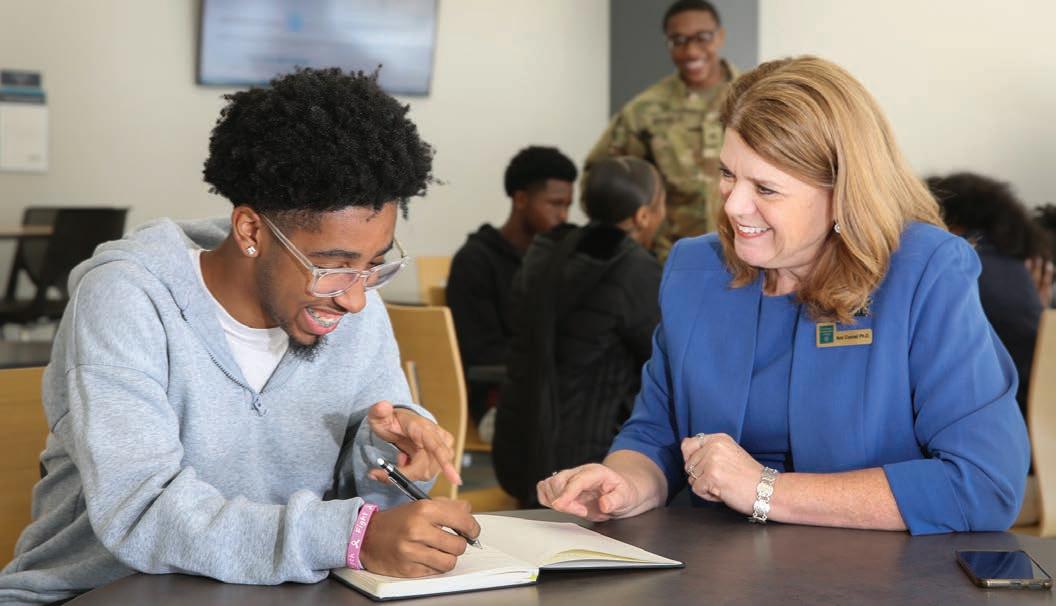
What if more students could see themselves not just graduating from high school but also attending college and earning a degree or certificate?
Through immersive summer academies, Cuyahoga Community College (Tri-C®) is showing middle and high school students that college isn’t just a possibility — it’s within reach, starting now.
Two academies at the College, Rising Stars and Pathfinder, are designed to break down barriers and inspire confidence, helping young learners imagine themselves as future college graduates. From hands-on science labs to career counseling to financial aid workshops, the programs create an early foundation for academic success and career exploration.
The Rising Stars College Readiness Academy, a collaboration between Tri-C and Warrensville Heights schools, introduces eighth graders to the college experience in a structured, immersive way. Its goal: to develop confident students who graduate from high school prepared to succeed in higher education.
The program meets for five weeks each summer at Tri-C’s Eastern Campus, with students spending five hours per weekday in workshops, counseling sessions and classroom activities. The schedule is rigorous but also engaging, designed to mirror the rhythm of college life.
Students learn communication and soft skills, receive personalized career counseling, and develop academic and career plans that connect their high school coursework to long-term goals. Tri-C’s Career Center counselors administer assessments that help students explore their interests and chart possible career pathways. Faculty and staff from recruitment, financial aid and academic divisions also meet with the students and their families to explain scholarships and other tuition support, as well as how to navigate the college application process.

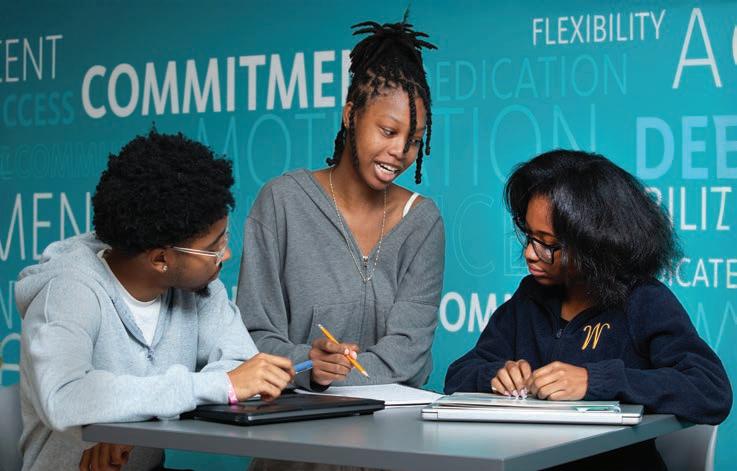
The program is not just theoretical. Rising Stars prepares students for College Credit Plus (CCP), Ohio’s statewide dualenrollment program. With CCP, students can take collegelevel courses while still in high school — at no cost — earning credits that seamlessly transfer to other public higher education institutions in the state. That means students can graduate high school already well on their way to an associate or even a bachelor’s degree.
The impact is clear. Since its launch, Rising Stars has helped more than 62 students begin their postsecondary journey. Of those, 90% of eligible participants continued to take college courses after completing the program. For families in Warrensville Heights, where higher education pathways have often been limited, this early start represents a dramatic shift.
Senior Isaiah Heyman-McDowell started in the program the summer before his freshman year of high school and is enrolled in five classes at the Eastern Campus this fall through CCP.
“I’ve met faculty here and created great relationships with them,” Heyman-McDowell said. “Whenever I’ve needed help, they’re right there. Rising Stars helped me feel like I was ready to take the next step toward college.”
Having already earned 40 credits, Heyman-McDowell plans to enroll at Pomona College to pursue a degree in political science and attend law school.
The Pathfinder College Explorations Academy brings Cleveland Heights and University Heights students to Tri-C for a hands-on introduction to college-level learning. Now in its second year, Pathfinder expanded in 2025 to offer two weeks of programming, reflecting growing demand.
The academy is open to eighth through 11th graders, giving a wide range of students the chance to sample college coursework. Each session is built around a different academic discipline, led by Tri-C faculty who connect classroom knowledge to real-world careers.
The schedule is dynamic and experiential. In the first week, students dive into health care, exploring anatomy models and conducting lab procedures. Outdoor sessions allow them to study ecosystems by identifying plants and discussing environmental science. In the second week, the focus shifts to broader college opportunities, including workshops on CCP and career readiness. Students also step into Tri-C’s culinary studio to explore hospitality careers and prepare lunch as a team. In the game design workshop, they experiment with 2D and 3D tools, learning how the skills behind their favorite pastime can translate into high-demand careers.
Pathfinder is as much about mindset as it is about skill set. The program encourages students to imagine how the courses they take in high school can build toward degrees and careers. The long-term vision is to turn that into an action plan for as many students as possible.

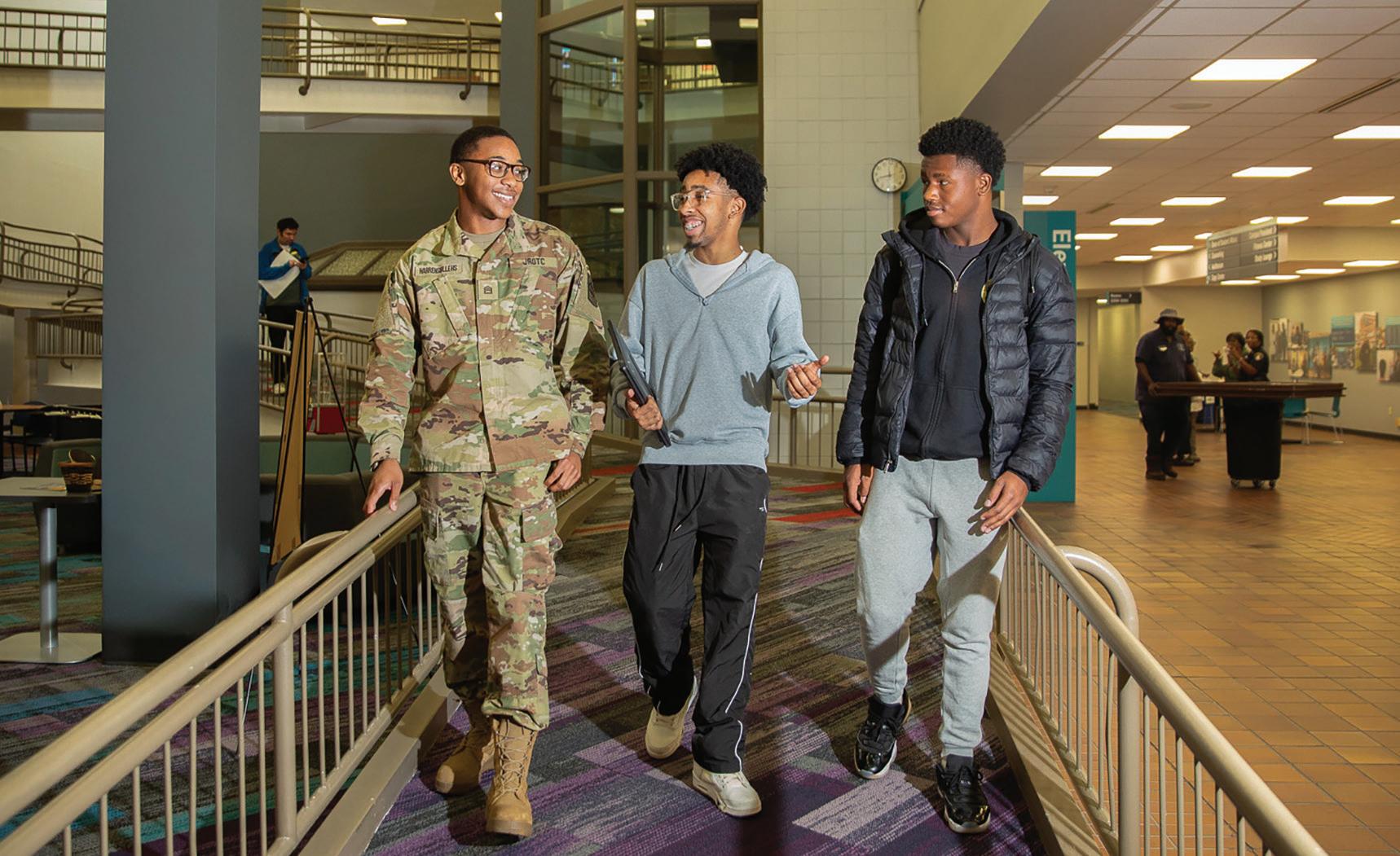
Neither Rising Stars nor Pathfinders would be possible without financial backing — and their results show the power of that investment. Rising Stars was supported by a $20,000 grant from Synthomer this summer, and Pathfinder is funded by Success Dollars through a two-year, $20,000 grant. Thanks to these resources, there is no cost to families, eliminating one of the biggest barriers to participation.
The return on that investment is immeasurable. Students in these academies often continue with CCP courses, earning free, transferable college credits while still in high school and saving families time and money toward college completion.
The broader impact is cultural. Stepping onto a college campus, learning from professors, and completing projects in labs and studios allows students to begin seeing themselves as college scholars. That shift in mindset — from “if” college is possible to “when” it happens — is arguably the greatest outcome of these programs.
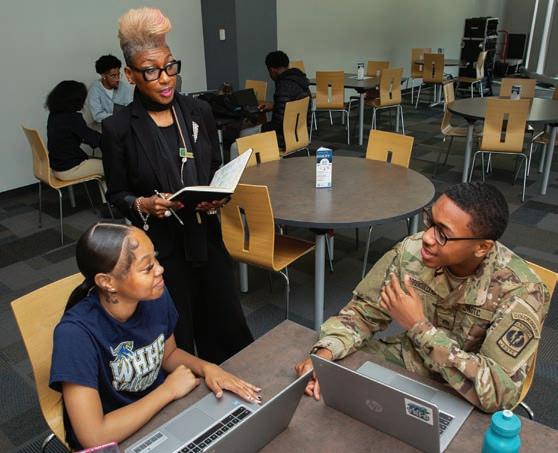
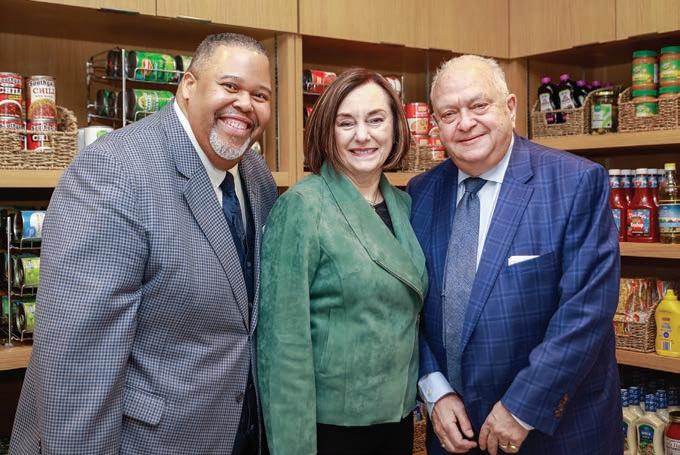
Lou Frangos likes to stop by the Cuyahoga Community College (Tri-C ®) Westshore Campus Food Pantry. He likes to see what’s happening there with the students. Ann, his wife, is a College Trustee. In November, the campus dedicated the Pantry in honor of the couple, whose donations over the years have afforded remodels and expansions of the Westshore Pantry.
I’ve always been a supporter of education and know from personal experience how a good education can change lives.
More than 50 years ago, Lou took classes at Tri-C, and we’ve always admired the College for its role in shaping Cleveland and Cuyahoga County. Today, our company, the Frangos Group, owns the building on Sumner Avenue where Tri-C first held classes. It’s meaningful to see how far the institution has come since those early days.
Tri-C provides students with the opportunity to start on a pathway to a four-year degree or gain in-demand job skills that will lead to good employment opportunities without incurring the burden of significant debt. Tri-C is not only an important resource for students but is also a trusted partner and leader in our community. I truly believe that Tri-C is where futures begin.
Our parents were immigrants who came to this country with nothing but dreams of a better life. I was the first in my family to complete college. Without financial support, I would not have been able to do so.
Today’s students face more challenges than just financial — from housing insecurity and transportation challenges to food insecurity and more. Giving back in a way that ensures young people have access to nourishing meals — even in a small way — was something we knew we wanted to do. The Tri-C Food Pantry fills a critical need for students, and we’re proud to help.
We hope students can focus on their education without the added worry of where their next meal will come from. If our support helps even a few of them stay in school, succeed and move forward with confidence, then we’ll have made a difference.
— Ann Frangos
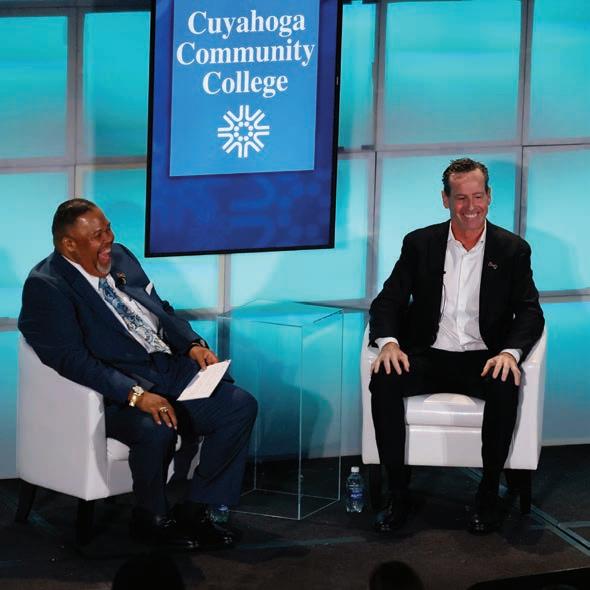





Whether you’re looking for trendy apparel, accessories or gear, our shop has something for everyone. Browse by category to easily find what you need, or shop by your favorite national brands for high‑quality, recognizable products. From hoodies and hats to mugs and more, you’ll find the perfect swag to represent Tri C with pride!
Open for Shopping